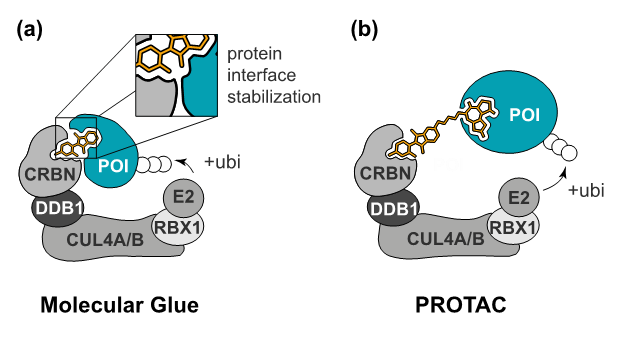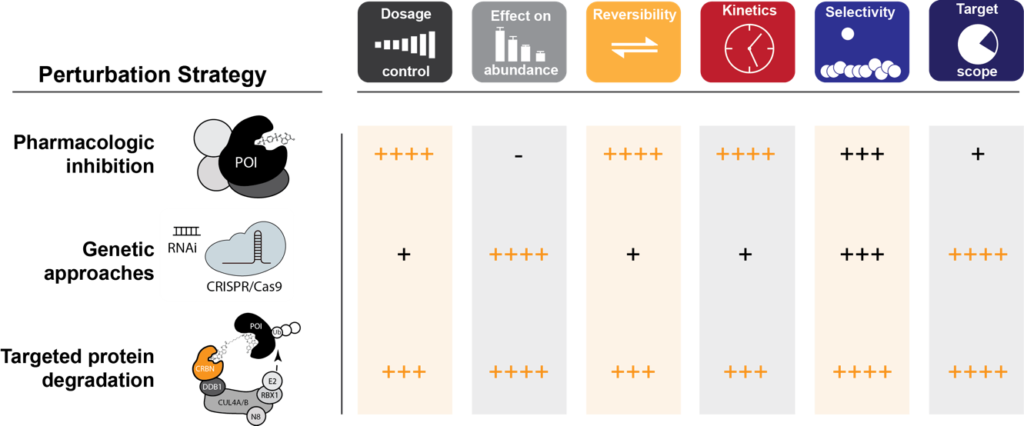Group Winter
Molecular glue degraders: chemical probing and functional characterization of DCAFs
Group Leader
Georg Winter
Georg Winter obtained his PhD from the Medical University of Vienna under the supervision of Giulio Superti-Furga, and went on as a postdoc with James Bradner at the Dana Farber Cancer Institute/Harvard Medical School. Georg was recruited as a CeMM Principal Investigator in 2016 where his research is now focused on using the unique molecular pharmacology of targeted protein degradation.
- Institute CeMM - Research Center for Molecular Medicine
- Phone +43 40160 70031
- Mail gwinter@cemm.oeaw.ac.at
- Web https://www.winter-lab.com/
Projects within consortium
Our lab is fascinated by research at the interface of chemical biology, gene regulation, proteolysis and cancer. In my research laboratory, we want to develop and apply novel chemical tools to probe and understand biological processes at a high kinetic resolution. In all aspects of our research, we aim to describe and comprehend research questions on a systems-wide level. We are deploying an integrative research strategy to understand how transcriptional networks are rewired in order to sustain an oncogenic state and how we could target resulting dependencies on the transcriptional machinery or associated chromatin regulators. In particular, we are trying to further accelerate the emerging field of targeted protein degradation and leverage its unique molecular pharmacology to elevate our understanding of oncogenic gene regulation and proteostasis.
Here, we propose a multi-disciplinary approach to chemically probe DCAFs to identify novel small molecular glues capable of re-directing their activity. Towards that end, we will deploy a scalable screening system to identify small-molecules capable of binding to DCAFs in cells. This will be followed by a target identification campaign supported by quantitative proteomics and chemical genetics strategies. Finally, we aim to elucidate structural determinants for the drug-induced molecular recognition of neo-substrates by deciphering the underpinning degron sequence and assaying kinetic determinants of ternary complex formation. If successful, this proposal will unlock novel corners of the “undruggable proteome” by identifying novel molecular glues to hijack the activity of DCAFs to degrade proteins outside the scope of traditional ligand-discovery efforts.

Two different strategies to induce targeted protein degradation. (a) Molecular glues are monovalent compounds that induce the dimerization of two proteins, here an E3 ligase substrate receptor and a neo-substrate. (b) PROTACs are heterobifunctional degraders that can individually bind to the E3 ligase and the protein of interest.

Targeted Protein Degradation as a Validation Strategy. Crucial features are compared among the three key perturbation-approaches in a semi-quantitative manner.
Project members
-
Postdoc
Marko Cigler
SFB Member
Targeted Protein Degradation related publications by Group Winter
- 2024 Degradome analysis to identify direct protein substrates of small-molecule degraders Cell Chemical Biology Go to publication →
- 2024 Inhibitor-induced supercharging of kinase turnover via endogenous proteolytic circuits bioRxiv Go to publication →
- 2024 Monovalent Pseudo-Natural Product Degraders Supercharge the Native Degradation of IDO1 by KLHDC3 bioRxiv Go to publication →
- 2024 Alkylamine-tethered molecules recruit FBXO22 for targeted protein degradation Nature Communication Go to publication →
- 2024 Orpinolide disrupts a leukemic dependency on cholesterol transport by inhibiting OSBP Nature Chemical Biology Go to publication →
- 2024 Large-scale chemoproteomics expedites ligand discovery and predicts ligand behavior in cells Science Go to publication →
- 2024 Targeted protein degradation via intramolecular bivalent glues Nature Go to publication →
- 2023 Discovery of Molecular Glue Degraders via Isogenic Morphological Profiling ASC Chemical Biology Go to publication →
- 2023 Discovery of a Drug-like, Natural Product-Inspired DCAF11 Ligand Chemotype Nature Communication Go to publication →
- 2023 Advancing Targeted Protein Degradation via Multiomics Profiling and Artificial Intelligence Journal of American Chemical Society Go to publication →
- 2023 E3-Specific Degrader Discovery by Dynamic Tracing of Substrate Receptor Abundance Journal of American Chemical Society Go to publication →
- 2022 POLθ processes ssDNA gaps and promotes replication fork progression in BRCA1 deficient cells Cell Reports Go to publication →
- 2022 Functional E3 ligase hotspots and resistance mechanisms to small-molecule degraders Nature Chemical Biology Go to publication →
- 2021 Identification and selectivity profiling of small-molecule degraders via multi-omics approaches Cell Chemical Biology Go to publication →
- 2020 Rational discovery of molecular glue degraders via scalable chemical profiling Nature Chemical Biology Go to publication →
- 2020 Selective Mediator dependence of cell-type-specifying transcription Nature Genetics Go to publication →
- 2020 Targeted protein degradation: current and future challenges Current Opinion in Chemical Biology Go to publication →
- 2019 Plasticity of the cullin-RING ligase repertoire shapes sensitivity to ligand-induced protein degradation Molecular Cell Go to publication →
- 2019 MTHFD1 interaction with BRD4 links folate metabolism to transcriptional regulation Nature Genetics Go to publication →
- 2019 Locus-Specific Knock-in of a degradable tag for target validation studies Methods in Molecular Biology Go to publication →
- 2019 Homolog-Selective Degradation as a Strategy to Probe the Function of CDK6 in AML Cell Chemical Biology Go to publication →
- 2019 Identification and characterization of cancer vulnerabilities via targeted protein degradation Drug Discov. Today Technol. Go to publication →
- 2018 LZTR1 is a regulator of RAS ubiquitination and signaling Science Go to publication →
- 2018 Targetable BET proteins- and E2F1-dependent transcriptional program maintains the malignancy of glioblastoma Proc. Natl. Acad. Sci. USA Go to publication →
- 2018 The dTAG system for immediate and target-specific protein degradation Nature Chemical Biology Go to publication →
- 2018 Functional TRIM24 degrader via conjugation of ineffectual bromodomain and VHL ligands Nature Chemical Biology Go to publication →
- 2018 Translation Termination Factor GSPT1 Is a Phenotypically Relevant Off-Target of Heterobifunctional Phthalimide Degraders ACS Chem. Biol. Go to publication →
- 2018 Acute Pharmacologic Degradation of a Stable Antigen Enhances Its Direct Presentation on MHC Class I Molecules Front. Immunol. Go to publication →
- 2018 Pharmacological perturbation of CDK9 using selective CDK9 inhibition or degradation Nat. Chem. Biol. Go to publication →
- 2017 MELK is not necessary for the proliferation of basal-like breast cancer cells eLife Go to publication →
- 2017 BET Bromodomain Proteins Function as Master Transcription Elongation Factors Independent of CDK9 Recruitment Mol. Cell Go to publication →
- 2017 Transcription control by the ENL YEATS domain in acute leukaemia Nature Go to publication →
- 2015 DRUG DEVELOPMENT. Phthalimide conjugation as a strategy for in vivo target protein degradation Science Go to publication →